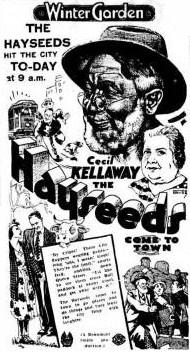Critical
Reviews for the film were mixed. [25]
The Sun was enthusiastic, describing it as "a fresh note in Australian picture — a blend of musical comedy, country life, farce, and romance." [26]
Everyone's reported that "from the sole viewpoint of entertainment value, the picture measures up to around average merit, but it is disappointing to see such experienced players as John Moore and Shirley Dale put forward the uninspired and stilted performances they do... Acting honors are easily won by the two players interpreting the burlesque caricature characterisations, Molly Rayner and Tal Ordell." [27]
However, a number of reviews suggested that the representations of Australians were a weakness. The Sydney Morning Herald complained that "the antiquated sentiment and the absurdly stilted dialogue of the original come staring all too plainly through... There are humorous passages on the screen; but, somehow or other, the farce has become toned down... Unfortunately, the production as a whole does not suggest Australian characters, or the basic qualities of Australian life." [28]
The Bulletin also took issue with the representation of country Australians. "No doubt such characters are meant for caricatures, but even a caricature should have some re-semblance to truth. It is time such films as "The Hayseeds" and "On Our Selection" were dropped, even though the producers and exhibitors may be able to claim, like the old-time vaudeville singer, that "it's getting them the money." These libels on our up-country folk may not do much damage here, but they are likely to create a disastrous impression of Australians in Britain and the U.S.A." [29]
Years later Stephen Vagg of Filmink who, while arguing Kellaway was "miscast", called the movie:
Kind of fun and endearingly odd. All the talk about drought and banks and being broke, while manufactured, have a basis of truth and would’ve meant a lot to depression era audiences; there are genuinely funny moments such as Kellaway and Ordell dressing up as Ned Kelly to help a friend; the songs are charmingly weird; the romantic scenes are entertainingly campy; the Busby Berkley-style number at the end is quite good; the sets and locations are pretty; there’s a fun bit where the Hayseeds visit Sydney; and the whole movie reeks of a genuine love of Australia which is engaging. [10]
Box office
The film proved popular with audiences on release in Australia and New Zealand. [30] By the end of 1934 it was estimated to have earned £16,000 in Australia and an overall profit of £5,900. [5] [6] A 1938 article said the film had earned more than £30,000. [31] The film was occasionally still screening in cinemas in 1950. [32]
In late 1933 Frank Tait expressed interest in Williamsons making more movies. [33] However this did not happen.
